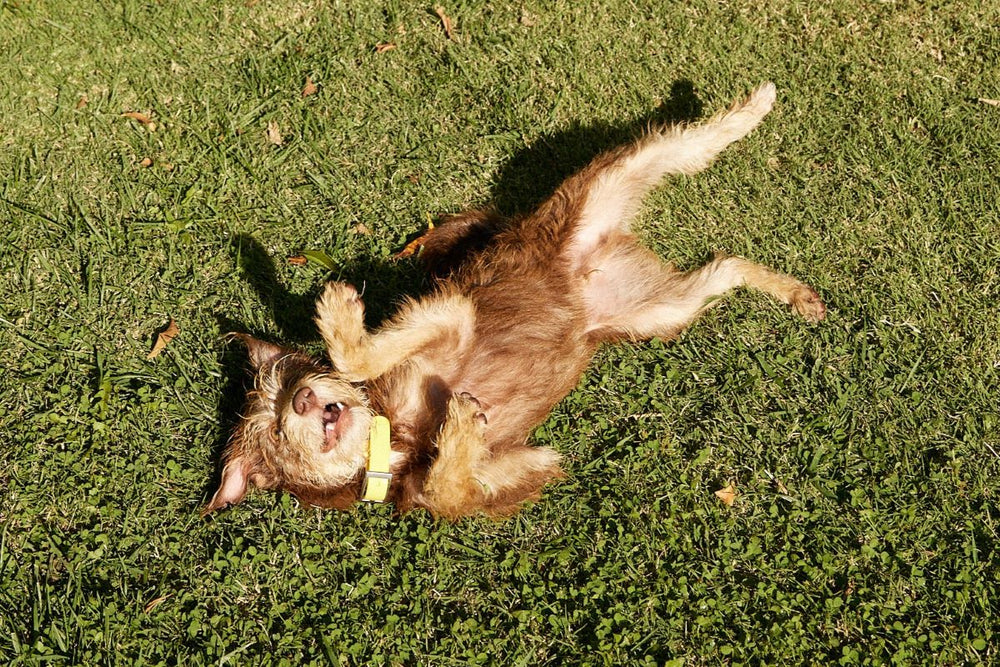By: Sara Ondrako, Certified Canine Behavior Consultant
As dog owners, our pups often do things that have us wondering, "why does my dog do that?!" Whether it's licking the air, biting their leash, or eating poop, our furry friends can be as confusing as they are adorable. Another cute but confusing thing our pups do is roll in the grass - and this is what we'll be talking about today.
For the most part, there's no harm in letting your dog roll in the grass, whether fresh-cut or a wild patch in which your dog's nose detected something fun. While it's generally a benign behavior, there are a few things to be cautious of and a few good reasons not to allow your dog to roll in the grass.

Reasons Why Dogs Roll in Grass
Dogs have a marvelous sense of smell, with over 100 million scent receptors in their nose compared to our 6 million. Olfaction is their primary source for gathering information. They can send and receive messages by simply interacting with the environment around them - including by rolling in the grass. Other dogs that have had fun before your dog arrives on the scene leave their own scent messages, and your dog can respond by grass rolling or urine marking in return.
Sometimes it's just for fun; other times, dogs really do just have an itch in that one spot they can't reach to scratch. For a routine happy scratch, dogs often shimmy their backs against the ground for 5-15 seconds. If your dog is carrying on with their shimmy for several minutes or seems to be exhibiting an obsessive behavior such as rolling until interrupted, something more significant may be at play. In this case, it's time to talk with your veterinarian and see how to support your pup.
When Not to Let Your Dog Roll in the Grass
The possibility of unknown pesticides or herbicides in an area is a good reason not to let your dog roll in unfamiliar grass. While some chemical applications are less concerning, many treatments still rely on highly toxic organophosphates that can make your dog sick. Use only pet-safe weed killer and insect repellents at home, ensure the area treated gets watered well, and avoid letting your dog access those areas for at least 48 hours after using any lawn products.
If you find that your dog likes to roll in smelly areas and you want to break that habit, there are a few things you can do. These tips can also help allergy-prone dogs avoid things that may worsen their symptoms.
- Work with a dog trainer or canine behaviorist that practices positive reinforcement training to curb grass rolling by offering an alternative behavior. When provided with alternatives, dogs can learn something new to do instead. Adding some extra scritches in your one-on-one time can help too!
- Offer an alternative surface to roll on, like turf, that can be easily cleaned. This allows your pup to still get that rolling fun in without exposure to allergens or stinky smells. When they roll on the new area, provide verbal encouragement and positive reinforcement to increase their likelihood of continuing that behavior.
- Refrain from punishing your furry friend for rolling in the grass - even if they have allergies or you find this behavior frustrating or interruptive. If you don't approach this behavior empathetically and provide alternatives, you are fighting an uphill battle. Remember - grass rolling is a natural and normal behavior in dogs! Fussing at them or punishing them only leads to confusion and relationship degradation with your canine companion.

When Grass Rolling Goes Too Far
Talking with your vet can help rule out any medical concerns that may be causing itchy skin, such as seasonal allergies or parasites like fleas or gastrointestinal worms. Check your pup for signs of skin irritation, like rashes in their favorite belly rub spots, and look for any redness between their paw pads and toes. This can be a sign of inflammation related to allergens. You'll want to support your pretty pup with highly nutritious dog food and be sure they are getting plenty of polyunsaturated fatty acids - especially Omega 3s - to promote a healthy coat and skin.
If your dog's allergy symptoms worsen or aren't manageable, they may have more severe or multiple allergies. This may require medical management for comfort through your veterinarian. For mild reactions, an over-the-counter allergy chew or supplement can help naturally fight histamines and boost immune response. To best manage your pup's allergies, pair their care regimen with routine hygiene, such as wiping your dog down with an unscented wipe after being outdoors.
Keep your pup on a routine prescription heartworm and flea medication. These medications are the most effective at combating external and internal parasites that may cause that signature butt-scooting body language in the grass. Heartworm preventives usually help with more than heartworm disease, often including preventives against hookworms and roundworms, common intestinal parasites. If your dog already has fleas or you notice worms in their stool, take them to your veterinarian for a treatment and prevention plan.
Silly Pups: That’s Just How They Roll
Whether it's picking up or dropping off scent messages, enjoying a sunny day while moving their body for fun, or scratching that one spot they can't reach, rolling in the grass is just a part of what makes dogs who they are. Outside of medical conditions or potentially toxic environmental concerns, this activity is generally harmless fun. Try joining in for some grass-rolling yourself to see how your pup responds!



